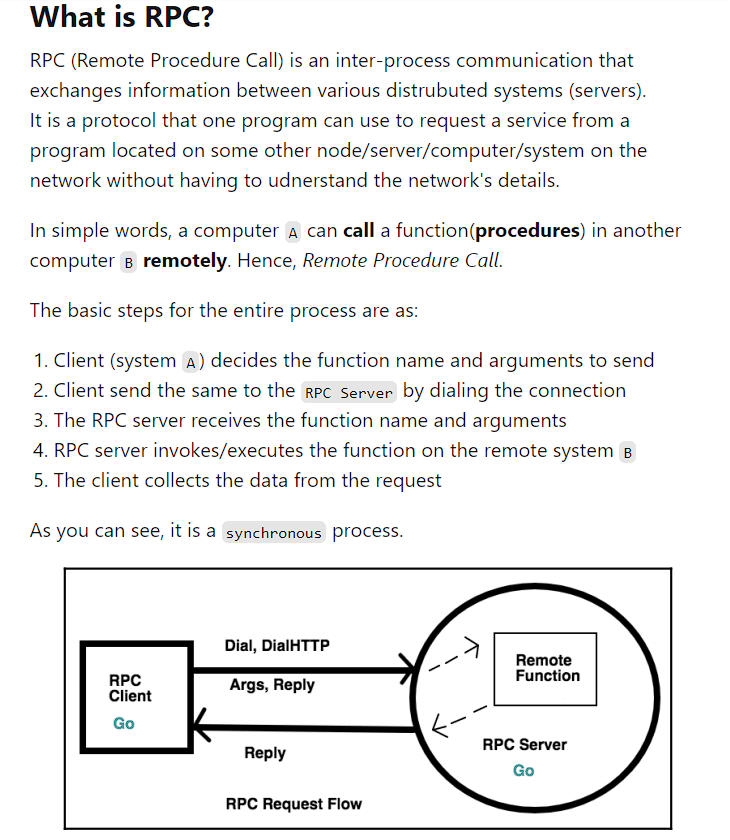Golang Roughwork I for RPC and Concurrency

RPC Server:
package main
import (
"fmt"
"log"
"net"
"net/http"
"net/rpc"
"time"
)
type Args struct{}
type TimeServer int64
func (t *TimeServer) GiveServerTime(args *Args, reply *int64) error {
// Set the value at the pointer got from the client
*reply = time.Now().Unix()
fmt.Println("time now: ", *reply)
return nil
}
func main() {
var timeserver TimeServer
// Register the timeserver object upon which the GiveServerTime
// function will be called from the RPC server (from the client)
rpc.Register(×erver)
// Registers an HTTP handler for RPC messages
rpc.HandleHTTP()
// Start listening for the requests on port 1234
listener, err := net.Listen("tcp", ":1234")
if err != nil {
log.Fatal("Listener error: ", err)
}
// Serve accepts incoming HTTP connections on the listener l, creating
// a new service goroutine for each. The service goroutines read requests
// and then call handler to reply to them
http.Serve(listener, nil)
}
RPC Client:
package main
import (
"log"
"net/rpc"
"time"
)
type Args struct{}
func main() {
// Address to this variable will be sent to the RPC server
// Type of reply should be same as that specified on server
var reply int64
args := Args{}
// DialHTTP connects to an HTTP RPC server at the specified network
client, err := rpc.DialHTTP("tcp", "localhost"+":1234")
if err != nil {
log.Fatal("Client connection error: ", err)
}
for i := 0; i < 10; i++ {
time.Sleep(10 * time.Second)
// Invoke the remote function GiveServerTime attached to TimeServer pointer
// Sending the arguments and reply variable address to the server as well
err = client.Call("TimeServer.GiveServerTime", args, &reply)
if err != nil {
log.Fatal("Client invocation error: ", err)
}
// Print the reply from the server
log.Printf("Reply from RPC server: %d", reply)
}
}
Crawler example:
package main
import (
"fmt"
"sync"
)
type Fetcher interface {
// Fetch returns the body of URL and
// a slice of URLs found on that page.
Fetch(url string) (body string, urls []string, err error)
}
type VisitedUrl struct {
visitedMap map[string]bool
lock sync.Mutex
}
func (urlVisited *VisitedUrl) proceedWithUrl(url string) bool {
urlVisited.lock.Lock()
defer urlVisited.lock.Unlock()
_, foundUrl := urlVisited.visitedMap[url]
urlVisited.visitedMap[url] = true
return !foundUrl
}
// Crawl uses fetcher to recursively crawl
// pages starting with url, to a maximum of depth.
func Crawl(url string, depth int, fetcher Fetcher, waitGroup *sync.WaitGroup, urlVisited *VisitedUrl) {
// TODO: Fetch URLs in parallel.
// TODO: Don't fetch the same URL twice.
// This implementation doesn't do either:
defer waitGroup.Done()
if depth <= 0 {
return
}
if !urlVisited.proceedWithUrl(url) {
return
}
body, urls, err := fetcher.Fetch(url)
if err != nil {
fmt.Println(err)
return
}
fmt.Printf("found: %s %q\n", url, body)
for _, u := range urls {
waitGroup.Add(1)
go Crawl(u, depth-1, fetcher, waitGroup, urlVisited)
}
return
}
func main() {
var waitGroup sync.WaitGroup
urlVisited := VisitedUrl{visitedMap: make(map[string]bool)}
waitGroup.Add(1)
go Crawl("https://golang.org/", 4, fetcher, &waitGroup, &urlVisited)
waitGroup.Wait()
}
// fakeFetcher is Fetcher that returns canned results.
type fakeFetcher map[string]*fakeResult
type fakeResult struct {
body string
urls []string
}
func (f fakeFetcher) Fetch(url string) (string, []string, error) {
if res, ok := f[url]; ok {
return res.body, res.urls, nil
}
return "", nil, fmt.Errorf("not found: %s", url)
}
// fetcher is a populated fakeFetcher.
var fetcher = fakeFetcher{
"https://golang.org/": &fakeResult{
"The Go Programming Language",
[]string{
"https://golang.org/pkg/",
"https://golang.org/cmd/",
},
},
"https://golang.org/pkg/": &fakeResult{
"Packages",
[]string{
"https://golang.org/",
"https://golang.org/cmd/",
"https://golang.org/pkg/fmt/",
"https://golang.org/pkg/os/",
},
},
"https://golang.org/pkg/fmt/": &fakeResult{
"Package fmt",
[]string{
"https://golang.org/",
"https://golang.org/pkg/",
},
},
"https://golang.org/pkg/os/": &fakeResult{
"Package os",
[]string{
"https://golang.org/",
"https://golang.org/pkg/",
},
},
}
References:
Written on October 24, 2023
